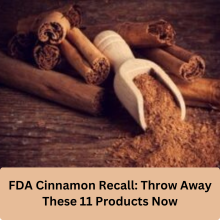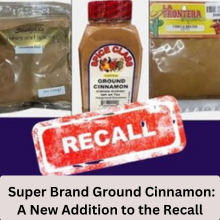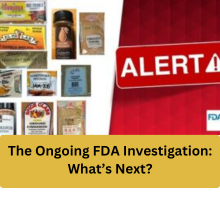
The U.S. Food and Drug Administration (FDA) has recently issued a recall on several cinnamon products due to the presence of elevated levels of lead. This alarming discovery has prompted the FDA to warn consumers to avoid consuming these products and to dispose of them immediately. The recall affects a variety of ground cinnamon brands that may have been sold in grocery stores across the U.S. In this article, we’ll break down everything you need to know about the recall, why it’s important, and how to protect yourself from lead exposure.
Why the FDA Cinnamon Recall Matters
Cinnamon is a popular spice found in kitchens worldwide. It’s commonly used in baked goods, savory dishes, and drinks. However, recent tests have shown that certain ground cinnamon products contain dangerously high levels of lead, a heavy metal known for its toxic effects. Lead contamination in food is a significant health risk, especially for children, pregnant women, and people with compromised immune systems.
In early November 2024, the FDA confirmed that multiple brands of ground cinnamon contain elevated levels of lead, which could contribute to lead poisoning if consumed regularly. The FDA’s findings have led to the recall of these products and a public health warning advising consumers to discard them immediately. Lead exposure can cause serious health problems, including developmental issues in children, kidney damage, and increased blood pressure in adults. Understanding which products are affected and taking action is crucial to ensure your safety and the safety of your family.
FDA’s Findings: Elevated Lead Levels in Cinnamon Products
The FDA’s investigation into cinnamon products began after testing revealed that several brands contained lead levels above the safety limits set by regulatory authorities. The agency found that 11 ground cinnamon products sold across various retailers had unsafe levels of lead, which led to the recall.
Lead is a naturally occurring metal that can be harmful when ingested in significant amounts. It accumulates in the body over time, leading to long-term health problems. The FDA’s testing and the subsequent recall are part of an ongoing effort to protect consumers from unsafe levels of toxic substances in food products.
Which Cinnamon Products are Affected?
The following brands and their specific products have been identified as containing elevated lead levels:
- Super Brand (Asian Supermarket): No listed best-by date.
- Asli (A&Y Global Market): Lot code: DDDLUS (Missouri).
- El Chilar (El Torito Market): Lot codes: D181EX0624; E054EX0225 (Maryland).
- Marcum (Save-A-Lot Food Stores): Best by: 12/05/25, 12 D8 (Missouri); 12/05/25, 12 D11 (Virginia).
- SWAD (Patel Brothers): Best by: 10/2026, KX28223 (Connecticut).
- Supreme Tradition (Dollar Tree): Best by: 10/06/25, 10A11 (California).
- Compania Indillor Orientale (Eurogrocery): Best by: 08/2024, L1803231 (Connecticut).
- ALB Flavor (Eurogrocery): Best by: 08/30/2025, LA02 (Connecticut).
- Shahzada (Premium Supermarket): No listed best-by date (New York).
- Spice Class (Fish World): Best by: 12/2026 (New York).
- La Frontera (Frutas Y Abarrotes Mexico, Inc.): No listed best-by date (New York).
If you have purchased any of these products, the FDA recommends you dispose of them immediately and not consume them.
Super Brand Ground Cinnamon: A New Addition to the Recall
In early November 2024, Super Brand Ground Cinnamon was added to the recall list. This product was identified by the Arkansas Department of Health, which collected samples for testing. The FDA confirmed that the product contained unsafe lead levels, triggering its inclusion in the recall. The exact cause of the contamination is still under investigation, but consumers are advised to avoid the product until further notice.
The Health Risks of Consuming Lead-Contaminated Cinnamon
Lead exposure is dangerous, especially for children, pregnant women, and vulnerable adults. When consumed over time, lead accumulates in the body, potentially causing long-term health issues.
For children, exposure to lead can cause developmental delays, lower IQ, and learning disabilities. Pregnant women exposed to lead can experience complications such as premature birth, low birth weight, and developmental issues for the baby. In adults, chronic lead exposure can lead to kidney damage, high blood pressure, and reproductive problems.
The FDA’s decision to recall these cinnamon products is a preventive measure to limit the risk of lead poisoning. If you suspect you’ve consumed any of the affected products, it’s crucial to consult with a healthcare provider to assess any potential health risks.
How Lead Gets Into Food: Understanding Contamination
Lead contamination in food is not always intentional. Lead is a naturally occurring metal found in the earth’s crust and can be present in soil, water, and air. During food production, lead can enter the supply chain at multiple points—whether through contaminated soil or through contact with processing equipment that may contain lead.
In some cases, however, producers may intentionally adulterate food products by adding lead to increase the weight of the product. This is known as adulteration. In the case of cinnamon, lead can be added to ground cinnamon to make it appear heavier and, therefore, more valuable.
Also read: Black Friday Deals Start Early: 10 Amazon Steals
What to Do If You’ve Bought Contaminated Cinnamon
If you’ve purchased any of the cinnamon products listed in the FDA’s recall, your first step should be to throw them away. Do not consume the product.
To help ensure that you are not purchasing contaminated cinnamon in the future, here are some tips:
- Keep the FDA’s list of affected brands on hand when shopping.
- If you already have the product in your kitchen, dispose of it immediately.
How to Identify Safe Cinnamon Brands
To avoid future risks, stick to cinnamon from well-known and trusted brands. Whole cinnamon sticks are also a safer option, as they cannot be easily adulterated with lead. Additionally, whole cinnamon sticks are less likely to come into contact with contaminated processing equipment.
Brands that Consumer Reports recommends as safe include:
- 365 Whole Foods Market (regular and organic)
- Sadaf
- Morton & Bassett San Francisco’s Organic Cinnamon
- Loisa Organic Cinnamon
By purchasing from these reputable brands or opting for whole cinnamon, you can avoid the risk of lead contamination in your food.
The Ongoing FDA Investigation: What’s Next?
The FDA continues to monitor the situation closely and test other cinnamon products for contamination. Consumers are encouraged to stay informed about the latest recall updates and take appropriate action if they find any affected products in their homes.
As the investigation unfolds, it’s essential to be vigilant and cautious when buying ground cinnamon or any other products prone to contamination.
What Experts Are Saying About the Recall
Experts like Brian Ronholm, Director of Food Policy at Consumer Reports, have expressed concern about the pervasive nature of lead contamination in food products. The ongoing testing and recalls suggest that lead contamination in food may be more widespread than initially thought, making it critical for consumers to take extra precautions when shopping.
Consumer Protections: What the FDA and Other Agencies Are Doing
The FDA plays a central role in ensuring food safety in the U.S. By issuing recalls, conducting product testing, and monitoring food contamination levels, the FDA helps protect public health. If you suspect a product is unsafe, you can report it to the FDA to help prevent future issues.
Also read: The Truth Behind Macaulay Culkin’s “Cabin Alone” Disney+ Movie
Conclusion
This recall serves as a reminder to stay vigilant about the products you consume. Lead contamination in food is a serious issue, but by staying informed and following the FDA’s guidance, you can protect yourself and your family. Always check for recalls, choose reputable brands, and consider using whole spices when possible. By doing so, you’ll minimize your exposure to lead and other potential contaminants.
FAQs
-
What cinnamon products are affected by the FDA recall?
- The recall affects brands like Super Brand, Asli, SWAD, Marcum, and others, with unsafe lead levels detected in their products.
-
Why is lead in cinnamon products a problem?
- Lead exposure can cause serious health issues, especially in children and pregnant women, including developmental delays and kidney damage.
-
How can I check if my cinnamon is contaminated?
- Check the list of affected brands and their product details provided by the FDA. If your cinnamon matches the recalled brands, dispose of it immediately.
-
Is it safe to consume cinnamon sticks?
- Yes, whole cinnamon sticks are a safer option as they are less likely to be contaminated with lead compared to ground cinnamon.
-
What should I do if I’ve consumed contaminated cinnamon?
- Contact a healthcare provider to assess any potential health risks and follow their advice on lead exposure.

